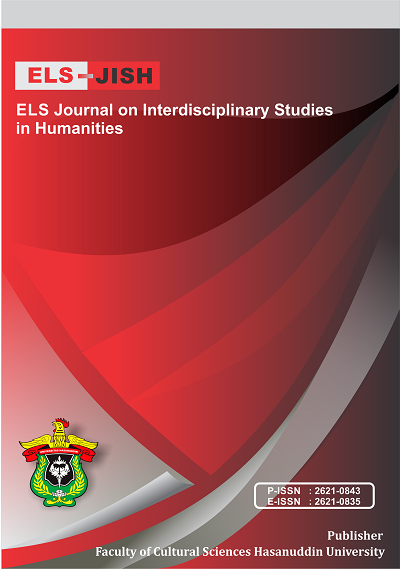Extensive Reading on Wattpad and Its Benefits to Students' English Skills: Students' Perceptions
DOI:
https://doi.org/10.34050/elsjish.v3i4.11714Keywords:
Extensive Reading, Wattpad, Students' Perceptions, English SkillsAbstract
The purpose of this study was to explore students’ perception’s towards Extensive Reading on Wattpad platform as well as its benefits to students’ English skills. Extensive Reading enables students to read a great deal amount of reading materials based on their personal interests and level of comprehension which is actually applied outside the class room for most people consider it as reading for pleasure. It has also been known that Extensive Reading has many benefits in improving students’ language skills. The advancement of technology over the years allows people to do many activities online, including Extensive Reading activity. Thus, Wattpad is considered to have enormous and various reading materials that can support extensive reading for the students. This study is a case study. The data were obtained from an in-depth interview with the participant who were two undergraduate students majoring English Education from a state university in Indonesia. The participants were selected purposively for the reason they were known to have been doing extensive reading activity on Wattpad for a quite long time, specifically for more than three years. The research findings showed that students have positive perceptions towards Extensive Reading on Wattpad which are categorized into three elements namely cognitive, affective, and conative. Four notable benefits of Extensive Reading on Wattpad were also mentioned by the students such as it contributed in unconsciously improving students’ writing skills, vocabulary mastery, speaking skills, as well as listening skills.
References
Andreas, S. (2018). PISA 2018 Insights and Interpretations. OECD Publishing.
Anindita, C. (2020). EFL Students' Perception towards Extensive Reading Practices in Higher Educatuion Level. Retain.
Arifuddin, A. (2018). Students' Perception in the Impact of Extensive REading Course.
Cain, K., Oakhill, J., & Bryant, P. (2004). Children’s Reading Comprehension Ability: Concurrent Prediction by Working Memory, Verbal Ability, and Component Skills. Journal of Educational Psychology. https://doi.org/10.1037/0022-0663.96.1.31
Dang, X. (2011). Factors Influencing Teachers’ Use of ICT in Language Teaching: A Case Study of Hanoi University, Vietnam. International Conference “ICT for Language Learning.”
Day, R., & Bamford, J. (2000). Reaching Reluctant Readers. The Forum.
Ferrer, E., & Staley, K. (2016). Designing an EFL Reading Program to Promote Literacy Skills, Critical Thinking, and Creativity. CATESOL Journal.
Grabe, W. (2009). Reading in a Second Language Moving from Theory to Practice. Reading in a Second Language: Moving from Theory to Practice.
Guthrie, J. T., Wigfield, A., & VonSecker, C. (2000). Effects of integrated instruction on motivation and strategy use in reading. Journal of Educational Psychology. https://doi.org/10.1037/0022-0663.92.2.331
Hacker, D. J. (2009). Handbook of Metacognition in Education. In Handbook of Metacognition in Education. https://doi.org/10.4324/9780203876428
Harmer, J. (2007). The Practice of English Language Teaching Fourth Edition. Cambridge: Pearson Longman.
Harrison, C. (2004). Understanding Reading Development. In Understanding Reading Development. https://doi.org/10.4135/9781446215401
Jain, S. (2013). Advantages of Podcasts in English Language. Journal of Indian Research.
Mason, B., & Krashen, S. (1997). Extensive Reading in English as a Foreign Language. System. https://doi.org/10.1016/S0346-251X(96)00063-2
McLean, S., & Rouault, G. (2017). The Effectiveness and Efficiency of Extensive Reading at Developing Reading Rates. System. https://doi.org/10.1016/j.system.2017.09.003
Mokhtari, K., Reichard, C. A., & Gardner, A. (2009). The Impact of Internet and Television Use on the Reading Habits and Practices of College Students. Journal of Adolescent & Adult Literacy. https://doi.org/10.1598/jaal.52.7.6
Park, J. (2016). Integrating Reading and Writing through Extensive Reading. ELT Journal. https://doi.org/10.1093/elt/ccv049
Powell, S. (2005). Extensive Reading and its Role in Japanese High Schools. The Reading Matrix.
Ramdarshan, B. M. (2018). The Return of the Social Author: Negotiating Authority and Influence on Wattpad. Convergence. https://doi.org/10.1177/1354856516654459
Rahman, F. (2018). The Constraints of Foreign Learners in Reading English Literary Works: A Case Study at Hasanuddin University. Journal of Arts and Humanities, 7(2), 01. https://doi.org/10.18533/journal.v7i2.1327
Rahman, F., & Amir, P. (2019). Trends in Reading Literary Fiction in Print and Cyber Media by Undergraduate Students of Hasanuddin University. International Journal of Education and Practice, 7(2), 66-77.
Renandya, W. A., & Widodo, H. P. (2016). English Language Teaching Today: An Introduction. https://doi.org/10.1007/978-3-319-38834-2_1
Ridder, H. G., Miles, M. B., Michael Huberman, A., & Saldaña, J. (2014). Qualitative data analysis. A methods sourcebook. Zeitschrift Fur Personalforschung. https://doi.org/10.1177/239700221402800402
Shen, M. (2008). EFL Learners’ Responses to Extensive Reading: Survey and Pedagogical Applications. The Reading Matrix.
Uden, J. (2013). The Extensive Reading Foundation’s Guide to Extensive Reading. ELT Journal. https://doi.org/10.1093/elt/cct010
Walgito, B. (2010). Pengantar Psikologi Sosial. Yogyakarta: Andi Ofset.
Rahman, F., & Weda, S. (2018). Students’ perceptions in appreciating English literary works through critical comment: A case study at Hasanuddin University and Universitas Negeri Makassar. Asian EFL Journal, 20(3), 149-172.
Yin, R. K. (2018). Case Study Research and Applications. In Case Study Research and Applications: Design and Methods.
Downloads
Published
How to Cite
Issue
Section
License

This work is licensed under a Creative Commons Attribution-NonCommercial 4.0 International License.






